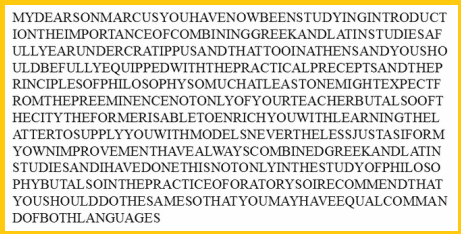
Right now, what bugs me when working on a manuscript is the worry that I will make a line edit but omit a space. For example, I will add the article ‘the’ to a phrase, but it runs into a neighbouring word on theline, like so. The result is a new typo in the script, where no typo existed. This torments me because not only is the script not improved, but it is a bit worse than before.
Unfortunately, collapsed spacing — as I’m calling it — seems an all too easy mistake to make when marking up a screen full of dense type. Alarmingly, I’ve caught portmanteau words created by the lack of a space, which somehow evaded the spell-checking software. One recent howler was ‘aswell’. For some reason, the super-computer behind Google Docs ruled ‘aswell’ was optimal, by not marking it up as a typo. Likewise, I have picked up syntactic errors which Grammarly did not flag, even when the sentence made no sense!
A bit disturbing for me but infuriating if you pay Grammarly to catch precisely this kind of thing.
Solutions? Software such as Adobe’s Indesign and Incopy can put dots between words to mark that a space exists. You can also use this tool to detect double spacing, which is another kind of typo to look out for. Microsoft Word also has it, at least my free Office 365 version does. In MS Word, you can access this handy feature by clicking the formatting button on the Home tab. I haven’t been able to find this in Google Docs yet and it would be a good addition to a future update if it is missing.
But as for why Google Docs decided ‘aswell’ was valid, I don’t have an answer. Someone should nicely ask the A.I in charge of the algorithm. Likewise Grammarly for not detecting glaring grammatical issues.
My main takeaway is that it’s not ideal to lean heavily upon technology for your editing needs. The only remedy I can think of is to be vigilant and to recheck a script for typos over and again, by eye. As an editor I should back myself to catch them. Most importantly, the client should. It feels good when I spot something that Grammarly or another tool missed; like I’m winning in a contest between man and machine in which the machine is far more capable but also vindictive and determined to prove that human editors are redundant, sad relics from a bygone era when local newspapers — at which I started my career in professional writing — turned a juicy profit.
Even longer ago than that, the cutting edge was something called Scriptio Continua. It’s a writing system dating from Classical Antiquity. I discovered it while doomscrolling on my phone the topic of history’s worst / funniest typos, in the same healthy way you might check with WebMD if that leg ache means emergency amputation is coming soon.
What caught my eye is that Scriptio Continua does not use spacing at all. Sounds great, right? No more stress about missing spaces, because spacing is forbidden. Also, ‘aswell’ is transfigured from a Frankenstein’s monster and redeemed into something that is perfectly okay.

But I don’t see clients demanding Scriptio Continua any time soon. How come? This piece of Scriptio Continua is from a speech by Cicero the Roman Senator, one of history’s most famous orators, translated into English without spacing courtesy of this post on the Classical Journal Forum Blog.
I’m no classicist but Scriptio Continua doesn’t exactly do the deathless words justice, for me. It makes it look like Cicero shouted out his speech in a stream of manic gibberish. Wikipedia reports that at one point Scriptio Continua even had something called ‘boustrophedon’, where lines were written in alternating directions; from left to right, then right to left, down the papyrus scroll.
Yikes!
